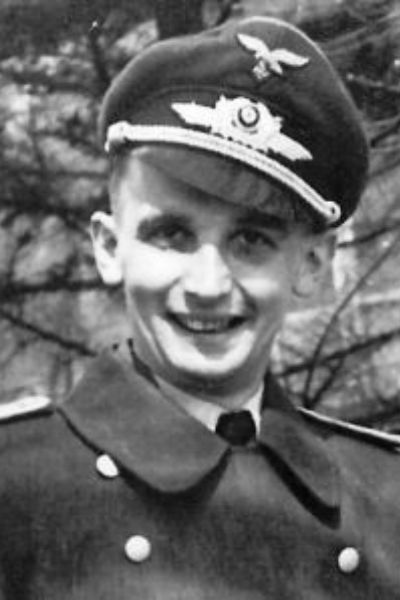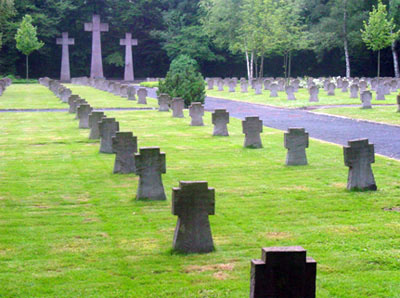Schulz, Günther Ernst Heinz
- Date of birth:
- November 28th, 1921 (Holten)
- Date of death:
- June 14th, 1945 (Denstorf, Germany)
- Service number:
- -1647-4./Flg.Ausb.Rgt.52
- Nationality:
- German
Biography
One of the best-documented teams from Operation Greif is the team around Lieutenant Günther Schulz. Manfred Bronny, Hans Reich and Karlheinz Weisenfeld were part of this team. Yet the knowledge about this team is generally poor. At most, they know that they were caught near Liège on 19.12.1944. Hardly anything is known about the details and how the lieutenant ended up near Braunschweig. Here almost all questions will be answered.
Günther Schulz lived in Neuss at the time; Günther Schulz's father had a higher official position there. Günther Schulz was born in Sterkrade. Sterkrade is now a part of Oberhausen, and a part of Holten. Günther's mother died as early as 1925. The father remarried and died in 1973, his widow in 1993. The latter is significant for the grave because the grave still plays a role in the story.
Perhaps because of his job with the government, Heinrich Schulz was a member of the NSDAP. Nothing is known about his political activities. At the Militärarchiv in Freiburg is a personnel file of his son Günther. Before joining the Wehrmacht, Günther Schulz led the Hitler Youth; he was active there as a Jungstammführer. From February 1940, Günther Schulz served at the Reichsarbeitsdienst (R.A.D.) Leverkusen-Schlebusch. In 1940 Günther Schulz obtained his "Abitur" (here VWO). Günther Schulz had plans to become a doctor. He wanted to go to the German colonies in Africa with his fiancé after the war. They wanted to work as a doctor there. Nothing came of all those plans. Günther Schulz was called upon to do his duty for the homeland.
From 28.06.1940 he served with the Flug-Ausbildungs-Regiment 52 in Bromberg, 12.01.1942 Fliegerhorst Münster-Loddenheide (Glider), 06.11.1942 Flug-Anwärter-Bataillon III (Lorient (France), 1943 Flugführerschule A / B 11 and finally 01.11.1943 1. Fernaufklärungsgeschwader 101 in Grossenhain / Sa. (1. Schülerkompanie).
A few assessments can be found in Günther Schulz's personnel file. These are just as interesting as his career. In April 1942 he was judged as someone who was intelligent and able to handle tensions well. Despite his young age, he is firmly in his own skin. He is open and honest. And especially the latter is worth remembering. After a course for "Kriegsoffiziernachwuchs" in June 1942 another review follows. According to that assessment, Günther Schulz has a healthy self-confidence and self-awareness and is mentally above average. The learning ability is good. This assessment ends with the observation that the student is willing to start an officer career, but with a temporary employment contract. In February 1943 the following assessment. One word stands out in this assessment. According to his superior, Günther Schulz has talent for improvisation.
In addition to his assessments, there is something to be found in his personnel file. Günther Schulz had to appear in Grossenhain on 03.06.1944 for a court martial (Feldkriegsgericht). The young lieutenant (I / Fernaufklärungs Geschwader 101) was charged with instigating theft (militärischer Diebstahl). The verdict does not show what happened at the time and who was involved. The sentence imposed was 4 months in jail and he would lose his rank! The verdict was watered down on 26.09.1944. The cell sentence was reduced by half and suspended. He was allowed to keep his rank but had to prove himself at the front. Because of the conviction and perhaps also to find a suitable place at the front, he was reassessed on 26.09.1944 in Grossenhain. Günther Schulz is described as an avid and convinced National Socialist. In addition, it is stated that he did not yet have the opportunity to prove himself before the enemy. And as a dot on the "i" is read; "Has emphatically reported to be deployed as a paratrooper at the front". And then they again point to the ability to cope with tensions and the ability to develop one's own initiative. Unfortunately, it is not further documented how Günther Schulz ended up with the operation Greif. The word "volunteer" must be taken very broadly from now on. And yet the young lieutenant remains loyal to his regime.
This is also the time to mention that the foregoing was unknown to the family. Günther Schulz finally returns to Otto Skorzeny's case file (M1106 Otto Skorzeny et al). In the file of Skorzeny you can find all the death sentences that were imposed on participants of Greif. The fact that not all death sentences have been executed still causes confusion. In addition to the death sentences, one criminal case has been completely added to Skorzenys file, namely the Schulz case.
The criminal case against Lieutenant Günther Schulz took place on 05.05.1945. The Günther Schulz team was arrested on 19.12.1944 between 9 p.m. - 10 p.m. near / in Liège. The military trial was limited to Manfred Bronny, Hans Reich and Karlheinz Weisenfeld on 23.12.1944. Günther Schulz acted as a witness and the three other team members were sentenced and executed. Günther Schulz told the court that he was being taken to France. He was brought back to Germany in February 1945. Lieutenant Schulz provided information during that period. Günther Schulz was interrogated by the British, the interrogation can be found here. The course of the timeline from imprisonment up to and including the trial is interesting, as are the interrogations of the Lieutenant. Günther Schulz described how he ended up in the Ardennes as follows: "I was in Einsheim in August 1944 before a German court because I had tried to cross the American line. I was sentenced to 3 months in prison and I would be dismissed. The Court of First Instance then decided that I had to go to the front, and get 3 months in prison.
His story starts to get truthful traits again when he arrives at the events of 07.11.1944. He came to Berlin, at the paratroopers headquarters. He had to fill in papers there and was sent to the Skorzeny unit. His English and French were tested there. He says that there were 4 groups and that people were classified in one of those groups according to their language skills. Then he was sent to Grafenwöhr. He also calls the code name "Rabenhuegel". Upon arrival in Grafenwöhr he ended up at Oberleutnant Stielau. After the language skills were tested here too, he would have been told that he would have to work as an interpreter. That the soldiers would be deployed as interpreters can also be read in other places. In an article in "Der Stern" of 20.04.2001, the former Obergefreiter Fritz Christ speaks. He tells about his experiences as a participant in the operation Greif. He also describes in the article that he was initially told that he would be deployed as an interpreter. Another source is the document from the German translation process group Arno Krause. It is also stated that the soldiers would be deployed as interpreters. We now know that this was not the case. The question of where the story has its origin must remain unanswered here. It is clear that different people come with the same story at different times.
After the trial against Bronny, Reich and Weisenfeld, Lieutenant Schulz was taken to France. Schulz was heard in Versailles about an attack on General Eisenhower planned by Skorzeny. Schulz's credibility comes under considerable pressure again when he claims that his friends had participated in an attack on Adolf Hitler. The process deals extensively with the route the team has driven in the Ardennes and with the clothing the men wore. It is striking that Schulz in Reims was heard by both Americans and Englishmen. Nothing is mentioned about the latter. Staff Sergeant L. Hansen of the 769th Military Police Battalion (Company C) was extensively heard about the case during Lieutenant Schulz's trial. He told how and where the jeep was stopped. The team was stopped on the N3 where the N3 crosses the channel, the channel that runs from Aachen to Liège. It was many small details that were incorrect. One of the team members had stored his documents in cellophane, highly unusual for an American. In addition, the number on his ID plate deviated from the number the man mentioned, also repeatedly. Explosives were found in the jeep. The witness describes it as explosive material in the form of American canteen bottles filled with solid explosive material with igniters. Furthermore, a large number of detonators with electrical wires were in the jeep. The weapons found included 2 machine guns and a lot of hand grenades. The soldiers had both English and American money with them. When searching the jeep again, a large stack of maps was found (approx. 30 pieces). About the clothing of the 4 soldiers, the Sergeant was able to tell that Bronny was wearing black German shoes. Weisenfeld and Reich were wearing complete American uniforms. Hansen thought he remembered that Schulz was wearing a German sweater and a German undershirt. All 4 wore American jackets and helmets. Another witness, Frederich Wellach, First Lieutenant, G-2 Section First Army, stated that from the outset he pointed out to the prisoners that, in their actions, they were not protected by the Hague Convention and would be executed. Wellach laterally stated that he was involved in the interrogation of the Billing team in Eupen. Schulz replied at the time that he did not expect anything else. Schulz had said to him that he was a member of the Einheit Stielau and was part of a "Nachrichtenzerstörertruppe". Their assignment was to block roads and to cause confusion on the roads in the direction of Liège. During that interrogation, Schulz also said that he should have reported to another group, a jeep with transmitting equipment. That unit would pass on its reports to the central post (Nachrichtenzentralstelle) of the 150. Panzer brigade.
In the end, Leutnant Günther Schulz was told his sentence and, as expected, the death penalty.
The execution took place on 14.06.1945 in a gravel quarry near Denstorf (near Braunschweig). In December 1945, a pastor in Neuss received mail from his office brother in Braunschweig. He announced that he was present on 14 June during the execution of Leutnant Günther Schulz and 5 others. Schulz had given him a scarf that was intended for his fiancé. Father Freise wrote that Schulz had died as a German officer. His last words were: "I am innocent, I do not know why I have to die. I am dying for Germany." On Boxing Day Pastor Freise wrote a letter to the fiancée of Günther Schulz. In that letter he described what happened on June 14, 1944. He was called to jail on 13 June. He was told that the next day 6 German soldiers would be executed. He visited the delinquents and found that Günther Schulz was very calm. The following morning the pastor arrived too late at the prison. The prisoners were already gone. In the end, the pastor still arrived on time at the execution site.
From now on the course of the letter is in accordance with the visual material known from the execution. The pastor walks to the pole where Günther Schulz will die. Günther Schulz again says he is innocent and asks the pastor to greet his fiancé. In addition to the letters that the pastor wrote, there are also farewell letters from Günther Schulz to his father and his fiancé. Schulz also clearly states that he is innocent in those letters. The full letters can be found on the site in the source reference. The temporary grave of Günther Schulz was in the central cemetery in Braunschweig. His body was dug up and cremated on 28.11.1948, the urn was placed in the family grave in the cemetery in Neuss.
Do you have more information about this person? Inform us!
Sources
- Photo 1: Wolfgang Stienes
- - https://www.oorlogsslachtoffers.nl/



